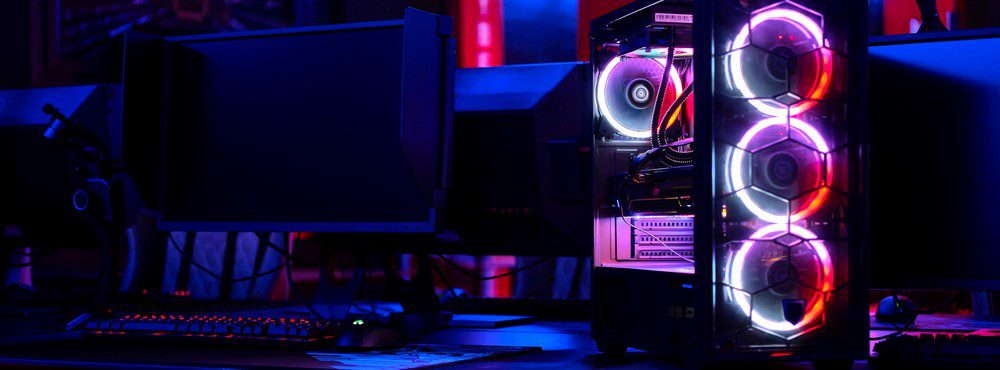Performance on paper is one thing. Performance on everyday tasks is another. But performance when the pressure is at its highest? That’s the stuff legends are made of — and, most of us hope, the stuff that our gaming PCs are made of, too.
Source: Gorodenkoff/Shutterstock
For gamers who want to push the limits of high-octane PC hardware, stress testing is an important way to figure out just how much your machine can handle. However, it’s not a must-do for every PC gamer, and it’s important to know some basics before you get started.
What Is a PC Stress Test?
Basically, a stress test (also known by the somewhat frightening name of a “torture test”) involves using software to place core components like your CPU, GPU, and RAM under extreme load. The aim is to observe how these system elements perform when pushed to their limits and look for potential problems like bottlenecks, cooling issues, and poorly optimized components.
That information can be crucial for gamers looking for high performance on graphics-heavy AAA titles, or on specialized game genres that require a lot of computing power, such as simulator games. If you’re having trouble with games crashing or freezing, it can also be a critical troubleshooting tool. Finally, for gamers who overclock their CPUs, stress testing provides important data that allows you to find the processor’s upper limits of speed and performance (which are different for every individual processor).
Benchmarking vs. Stress Testing
If you’ve heard the term benchmarking, you might be a little confused right now. Isn’t benchmarking pretty much the same thing as stress testing? They use some similar tools, such as performance testing applications, but their goals and methods are different.
Ultimately, benchmarking vs. stress testing is a question of degree. Benchmarking is about testing your PC under something like real-world use conditions, with goals such as comparing its performance to a game’s required specs or observing performance improvements from a new part or configuration. Stress testing, by contrast, is about pushing your components to their absolute limits and discovering what they can handle.
Just to make things more complicated, stress testing can be a part of benchmarking. If your PC is specifically built to handle heavy workloads, the difference between stress testing and benchmarking can be fairly vague. For those running this kind of muscular PC hardware, stress testing may become a regular practice, especially if you regularly tweak your setup.
Source: Standret/Shutterstock
When to Stress Test Your PC
Here’s the TL;DR: Most gamers don’t need to conduct a true stress test on their gaming PCs. A few rounds of benchmarking are definitely recommended any time you complete a new build or replace parts, but true stress testing isn’t necessary for the majority of PC gamers. However, if you’re in one of the following categories, a stress test can be an important tool.
- Overclocking is the most common use case for a true PC stress test. Users who overclock their CPUs need to be sure that their system will remain stable even when they’re running their processor over its factory speeds. Multiple rounds of stress testing with an overclocked CPU are an important part of finding a stable overclock speed.
- Stress testing can also be important if you’ll be using your PC for heavy-duty professional applications like animation rendering, big data analysis, or machine learning. These applications can be so demanding that even basic benchmarking probably involves some level of stress testing — especially when your professional output is on the line.
- If you’re experiencing crashes or other symptoms of instability when your PC is under heavy load, stress testing can help you discover the source of your issues. However, you’ll probably want to start with some less-intensive benchmarking first, and then move up to stress testing if the problem still eludes you.
PC Stress Testing: Practical Tools and Tips
- Choose stress testing software that suits your application.
Tons of different stress testing software tools are out there today, many of them inexpensive or free. Note, however, that different tools are designed for different components and applications, so make sure you’re choosing (for example) a CPU testing tool if you’re interested in overclocking. Some tools may also be best suited for specific applications, such as tools designed to measure performance in a certain game or in machine learning projects.
- Plan your stress test when you’re not using your PC for anything else.
The whole point of stress testing is to force your PC to use all of its available resources — which means it won’t have much left over for things like gaming or work. (Running other programs can also interfere with the results of your tests, so it’s best to simply leave your PC alone.) Depending on your testing methods, it can also take anywhere from a few minutes to an hour-plus to complete a stress test, so the simplest solution is to plan the test for a time when you won’t need your PC for anything.
- Keep an eye on your temps and start small.
A properly run stress test has a low risk of damaging your PC, but the emphasis there is on “properly run.” An excessively powerful stress test that generates more heat than your cooler can handle will usually mean your CPU shuts down — but if heat increases too quickly, your PC might not be able to shut down before the heat causes damage.
Thus, best practices are always to keep an eye on your PC during the stress test and end the test if you see CPU or GPU temperatures hitting unsafe highs (usually above 90º to 95ºC, depending on the part and model). To keep your PC out of this danger zone, it’s often best to start with a more modest benchmark testing and then gradually work your way up to higher-speed, higher-temperature stress testing. Finally, before you run a test, look at the software developer’s recommended test time and don’t exceed what it’s designed for.
Source: Alex Tihonovs/Shutterstock
Once you’ve performed a few stress tests, you’ll see that there’s really nothing too difficult or scary about them. In fact, you’ll almost certainly be grateful for the enhanced understanding of your PC systems that they can offer — and the satisfaction of knowing exactly how far and how fast you can push your gaming PC’s performance.































